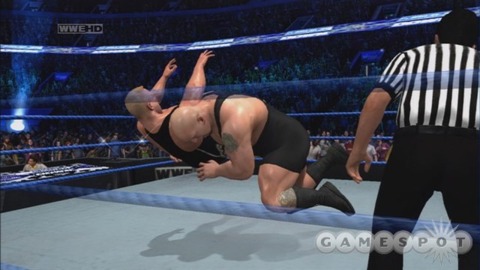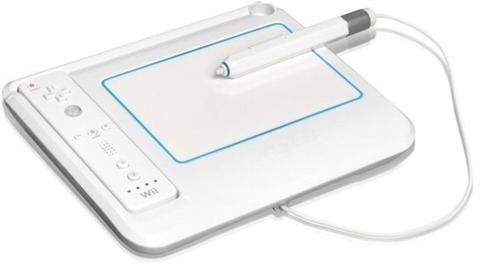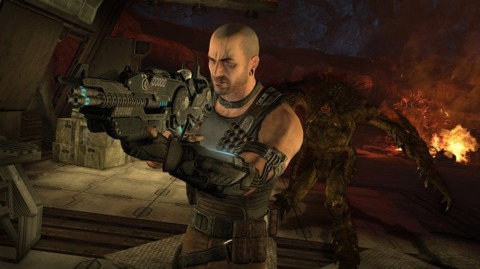Q&A: THQ CEO Brian Farrell
Publisher's chief executive discusses MX vs. ATV Alive's DLC-powered approach, uDraw sales, and the state of the gaming industry.
Next spring, THQ will be conducting an experiment. As revealed during June's Electronic Entertainment Expo, the next installment in the publisher's popular off-road racing series, MX vs. ATV Alive, will go on sale at a low price point of just $40. Following its launch, the game will see regular releases of major downloadable content and sales of smaller items to generate further income.
MX vs. ATV Alive's business model is a novel approach, and the man behind it is THQ CEO Brian Farrell. The executive took some time this week to talk with GameSpot about MX vs. ATV and other developments. These include the response to THQ adding a onetime-use code to unlock the online modes of its UFC and WWE games and sales of the recently released uDraw tablet. He also touched on launch plans for the Warhammer 40,000: Dark Millennium Online massively multiplayer role-playing game and how the game industry may rebound in 2011.
GameSpot: Do you see MX vs. ATV Alive as an experiment or the real future of pricing for gaming?
Brian Farrell: Well, it's a bit of an experiment. But what do we know? We know that how people are playing games and the way they're delivered are changing. And so this is a way to deliver a customizable experience for the player in a brand-new pricing model. So it is an experiment. I think it's based on what we've seen in other markets. You see what's going on in Asia and other markets with free-to-play and you do customize your own game, and you really spend how much you want to spend on your gaming experience.
So that's what inspired us for this business model. And it's all about what does the gamer want and how can we deliver a great gaming experience that allows them to customize that experience and also pay for those modes that they want to play.
GS: So MX vs. ATV is going to be a more minimal game initially, with DLC available right away at launch? How exactly is this going to work?
BF: Well, let me clarify that right off the bat. It's going to be an awesome game, right off the bat. It's always been a very big game. So to most users, you won't see any difference between the MX [vs. ATV] game that's in the box and the experience that you've had in our previous MX [vs. ATV] games. But there's a DLC plan. We will be rolling that out to the press what the exact tack of DLC will be and when. But there's a robust lineup of games. In fact, I'm going to the studio tomorrow and going over some of these things.
But the idea is, yes, some DLC within a very short period after launch, with more delivered on a regular basis after that. And, again, it's really up to the player if they want what's in that additional DLC pack, they can buy it. And if they're delighted with the great game experience we're delivering, that's fine, too.

GS: Take-Two CEO Strauss Zelnick said that one way to keep people from buying used games was a robust lineup of DLC. Is that a factor in your DLC-centric approach for MX vs. ATV?
BF: Well, the big win in the games business is keeping the gamer engaged with your experience. And whether that's for a long gameplay experience, a lot of different replay value, or DLC, online play--there's a lot of different ways. But a huge win in the way we think about this business is keep the gamer engaged with your experience, and that was the big impetus behind doing this.
GS: Now, I know it's a small percentage of the entire gaming market, but are you going to be offering disc-based DLC for those people who don't have an Internet connection?
BF: We don't want to rule that out. There is potential for us to wrap up the DLC as some people have done in the past and put it in a package at some point. But, as you know, most active gamers do have an Internet connection. Most of the 360s and PlayStation 3s are connected now. And that's the fundamental base of our users.
GS: Now, if you see this experiment as successful, this model, can you see this being applied down the line to other franchises?
BF: This experience lends itself--because it is such a big game you can download different tracks, riders, bikes, vehicles, game modes like we've done in the past. There's so many different things we could put in DLC. And this kind of experience lends itself, from that perspective, but also we know that the MX [vs. ATV] brand is a very mass-market brand.
So making the initial purchase price of $39.99 very mass-market friendly, it seemed to be a natural fit. We still intend--and, in fact, we want to make sure everybody understands--that the price point for great games for the most part is still going to be $59.99. You know, when we bring out Homefront in March, it's going to be a $59.99 game. [Warhammer 40,000:] Space Marine next spring or summer, $59.99. Saints Row [3], $59.99.
So it depends on the experience. And this is all about the user experience and making sure that if we can deliver a great experience, make it a little bit more variable and customizable for the player, and yet a sound business model for us, we think that's a win for the gamer and a win for the company.

GS: Now, let's shift gears to WWE vs. Smackdown 2011. That game shipped with a onetime code to access the multiplayer mode, just like UFC 2010 Undisputed. Buyers of used copies of the game have to pay $10 for a code of their own. Have you been seeing a lot of people buying up that online pass for WWE and UFC?
BF: Yes, and even speaking with some of my peers, it's very important for game companies now. We need to participate in the used-game business. We want to make sure that the ecosystem works between developer, publisher, retailer, and gamer. There's got to be an ecosystem that works for everybody.
So if we can find a way to participate in that through second-user access or something like that, we're not trying to stop used games or punish used gamers. It's actually the opposite. We want to make sure that we participate in the value chain because we are the ones spending tens of millions of dollars investing in these great products. And that's important to our business model. So it's more about getting the participation and the ecosystem right.
GS: Right. But have you seen a large response after UFC and WWE went on sale?
BF: It's a good question. We know that there is a good response. We are getting a number of people signing up. We just don't know how many who have bought used are not signing up. So it's hard to answer the question terribly specifically, if you understand what I'm saying. We have a good response because it is such a great online mode that a used gamer--we've given them a reason to pay the $10 to participate in that. But we just don't know how many used gamers aren't signing up.
GS: Now, let's look at a more macro question. The verdict isn't quite in yet, but it looks like 2010 is going to be below 2009 in terms of the US game industry sales, and 2009 was pretty bad compared to 2008. So do you think the industry is going to rebound in 2011?
BF: Well, I'm a big fan of NPD, and we're not declaring war on them, but what we've been trying to clarify is people are looking at just NPD now, right? And back to our earlier discussion about MX vs. ATV, none of that DLC revenue is going to be captured in any service we know now that would be reported as part of the games industry. You know, hopefully tens of millions of dollars will come from just that single product.

So let's look at what NPD doesn't do now--no DLC revenues, no MMO subscription revenues, doesn't track iPad/iPhone revenues. And so, again, I'm not being critical of them, but it's just a lot of investors or people who look at the industry and see the NPD box product sales are down. Where our point of view is more people are playing games than ever before. And we as an industry need to come up with a different way to look at the industry to capture all those revenue streams. Our Steam business is going through the roof, but that's again not reported as part of NPD. So I think the industry is a lot healthier than just what NPD is reporting.
And then, to answer your question specifically when we look into next year, we're really pleased with what's going on with PS3 and 360 hardware sales. We heard some good news over the weekend, too, about Wii sales as well. And all that hardware is going to buy new software. So we think with these emerging businesses, all the online and the unreported things, that plus people buying software for the game machines that they're buying now, we think 2011 should be a stronger year for the industry. And I think with our lineup, I think it's going to be a particularly good one for us.
GS: Going back to your 2010 lineup, you guys recently released the uDraw Tablet. How has the initial reaction to that been so far?
BF: We've been very pleased with the uDraw. You know, we originally went out and said we thought we could do 1 million units in our fiscal year, which ends in March. Based on the initial demand from retail, we said we were going to try and increase that to between 1,250,000, maybe 1,300,000. So really the issue we're going to have there is keeping them in supply over the holiday season. And so we think we've got a winner on our hands. It goes to show you, if you bring a new experience to players, there's a real opportunity.

GS: But you don't have any hard sales numbers right now?
BF: Nothing that I can share with you, not at this time.
GS: All right. Let's move to another question. How is the Red Faction SyFy miniseries proceeding? How involved is THQ with that?
BF: Well, again, we have creative control over the brand. But that's almost not important. And what I like about our partner in SyFy is it's a collaboration as much as a contractual partnership. So they're responsible for all the production of the series. But we have several writers on staff here that are working with them. They're doing the original miniseries pilot in conjunction with our game. But our writers have been involved with their writers. You know, we have complete control or yea or nay to make sure it is consistent with our brand. But it looks like they're going to deliver on the promise. And, again, it's been a great collaboration so far.
GS: Now, I know TV schedules are pretty fixed. But sometimes games get delayed just for quality control purposes. They're not really tied to a season like television is. So does that scheduling complicate things when you want to release a game in conjunction with a TV pilot?
BF: Yeah, you want to be in close proximity. But, again, you probably know the Red Faction brand has been around. I'm looking up at my wall here. I think the original one was in 2001. So it will be 10 years. In fact, it'll be almost exactly 10 years when this one launches. So there is brand awareness. The purpose of the SyFy relationship and the transmedia drive that we have is just to build more awareness on the brand. If it's around exactly the same time, that would be the best.

But, really, because there's already a lot of awareness around the Red Faction brand, anything in close proximity works for us, particularly if we build that brand over time. So our current thinking is we've had a very robust team working on it. You know the team that's been working on it there, they're the pros from Dover within THQ here as well. So I think we're going to be on date pretty much with the launch of [the] SyFy series.
GS: All right. Now is Saints Row: Drive By going to make the 3DS launch?
BF: We haven't set about a launch just because we're not sure exactly at all about the quality of the product. So we'll keep you posted on that one. But to us, I mean, it's always great making launch. I like making the launch of a new hardware system. But we've got too strong a brand in the Saints Row brand to ship anything but a great experience.
GS: Now, I know you guys were a little disappointed in the sales of UFC 2010, and now the next one's not coming out until next fall, it looks like. So it's almost an 18-month space between installments. Is that going to be standard for the UFC series? Is it going to be 18 months between installments?
BF: Let's see how the 18-month system works. You know, it's a great brand, as you know, it's a fantastic brand. But unlike NBA or NFL, the rosters don't change all that much. So we think giving at least 18 months--I think it's going to be even closer to 20 or 21 months--between the last one and the next game, we think that gives the consumer more time to enjoy the experience that we gave with 2010 and make sure we give them a great experience for the next one. So, yeah, I think giving it 18 to 24 months is probably about right. But let's see what happens with the next launch.
GS: How is the massively multiplayer project Warhammer 40,000: Dark Millennium Online shaping up?

BF: We've not picked a firm launch date yet. As you know, those are the most complex games and gaming systems on the planet. And we know what the competition is. So we know we need to do it absolutely right. So it's still a couple of years out. But, I mean, even the early version--in fact, I've got a review of that product at 3:00 and then I'm actually going to be down at that office and studio on Friday looking at the progress there. We're really excited about the game, but when we know we have--well, first of all, a firm beta date, obviously we'll announce that. But it's still a couple of years out because we want this to be a real defining experience for the MMO player.
GS: Now this is THQ's first major MMORPG. What's kind of the biggest challenge you guys are facing? I mean, you've got a well-known IP out there, but it's also a very competitive space. If you launch a couple of years out, you'll have both World of Warcraft and Star Wars: The Old Republic to contend with. How will Warhammer 40,000 differentiate itself?
BF: Well, first, it's such a great universe. I mean, we have shipped over 5 million copies of Warhammer 40K PC games. We'll have those players play the online experience. It's not an MMO, obviously, but we know there's a dedicated fan base. We've delivered them great games, and we believe that if we deliver a quality MMO experience, we can convert those PC box product game users into MMO subscribers.
But you've got to deliver a differentiated experience that still feels familiar to an MMO player. That's what we intend to do with Warhammer 40K. So make some of the systems familiar so it's not foreign to a player how to continue to level up, but make it a really unique experience based on that IP. And that's the vision for the product, and I think the team down at Vigil is executing on that vision, from what I can see.
Got a news tip or want to contact us directly? Email news@gamespot.com

Join the conversation